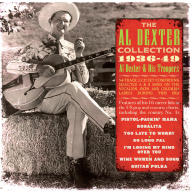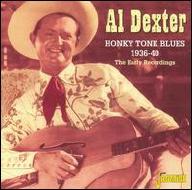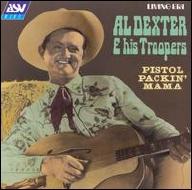Born Clarence Albert Poindexter in Jacksonville, TX, on May 4, 1902, Dexter began playing square dances around oil-rich eastern Texas during the 1920s. The Depression forced him to work as a house painter, but Dexter began moonlighting after he formed the Texas Troopers in the early '30s. The group recorded for Okeh and Vocalion during the rest of the '30s and into the '40s. In 1944 -- the first year when charts can be accurately predicted -- Dexter scored four number ones on the country chart. Pistol Packin' Mama was re-released on the B-side of Rosalita, and both songs hit number one in January 1944. His biggest hit of the year came in March, though, when So Long Pal spent 13 weeks at number one on the country chart -- its B-side, Too Late to Worry, Too Blue to Cry, stayed at the top for two weeks.
The last of the war years were also successful for Dexter: I'm Losing My Mind Over You/I'll Wait for You Dear, hit number one and number two respectively in January 1945, with the former spending seven weeks at number one. His second double-sided hit of the year, Triflin' Gal/I'm Lost Without You, both hit the Top Five in August. In February 1946, Dexter's Guitar Polka spent almost four months at number one; it was his biggest country hit and managed the Top 20 on the pop charts (also producing the number two B-side Honey Do You Think It's Wrong). After Wine, Women and Song also hit number one later in 1946, Dexter recorded three more Top Five singles during 1946-1947, It's Up to You, Kokomo Island, and Down at the Roadside Inn. His final chart singles were the 1948 Top 15 singles Rock and Rye Rag and Calico Rag.
All told, Dexter received 12 gold records for million-sellers in the five-year period from 1943 to 1948. He won an Oscar for Guitar Polka and was voted the Leading Artist of 1946 by the Jukebox Operators Association. In the late '40s, Dexter opened his own club in Dallas; he performed there until his retirement. Dexter was inducted into the Nashville Songwriters Hall of Fame in 1971. ~ John Bush, Rovi














